Comprehensive Guide to Garden Maintenance in Aldgate
Introduction to Garden Maintenance
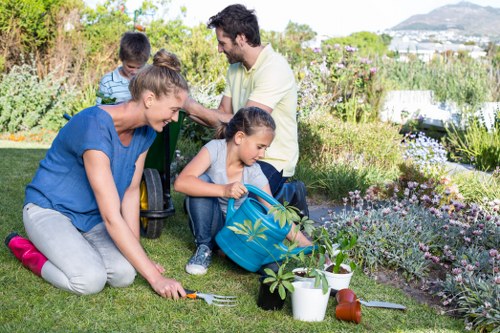
Maintaining a beautiful garden in Aldgate requires a blend of knowledge, dedication, and the right techniques. Whether you're a seasoned gardener or a beginner, understanding the fundamentals of garden upkeep ensures your outdoor space remains vibrant and healthy throughout the year.
Garden maintenance goes beyond just watering plants. It involves a series of tasks that help in sustaining the aesthetic and functional aspects of your garden. From soil health to plant selection, each element plays a crucial role in creating a thriving garden environment.
In Aldgate, the unique climate and urban setting present specific challenges and opportunities for garden maintenance. Adapting to these local conditions is essential for achieving a lush and sustainable garden.
Essential Garden Maintenance Tasks
1. Regular Weeding
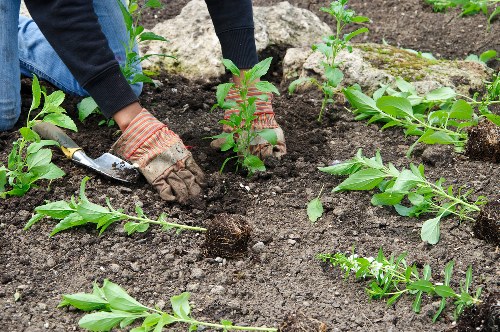
Weeds compete with your plants for nutrients, water, and sunlight. Regular weeding is essential to maintain the health and appearance of your garden. It's best to remove weeds when they are young to prevent them from spreading and taking over your garden beds.
Using mulch can significantly reduce weed growth by blocking sunlight and creating a barrier. Additionally, consider using organic weed killers or natural methods to keep your garden eco-friendly.
Consistency is key. Allocate time weekly to inspect your garden for weeds and address them promptly.
2. Pruning and Trimming
Pruning helps in shaping your plants, promoting healthy growth, and preventing diseases. Regular trimming ensures that your plants receive adequate air circulation and sunlight.
Different plants require different pruning techniques. For instance, flowering shrubs may need pruning after blooming, while fruit trees benefit from annual pruning to enhance fruit production.
Always use sharp and clean tools to make precise cuts, minimizing the risk of damaging your plants.
Seasonal Maintenance Tips
Spring Maintenance
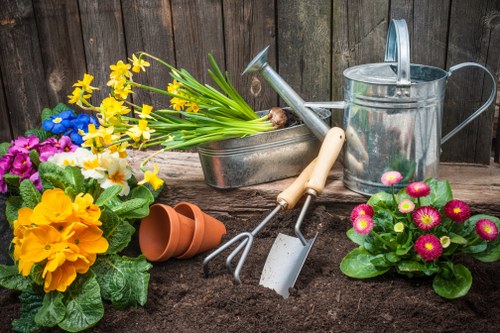
Spring is a crucial time for garden maintenance in Aldgate. As the weather warms up, it's the perfect opportunity to prepare your garden for the growing season.
Start by cleaning up any debris from the winter months. Remove dead leaves, branches, and any fallen fruits that can harbor pests and diseases.
Planting new shrubs, flowers, and vegetables during spring ensures they have ample time to establish before the heat of summer arrives.
Summer Maintenance
Summer in Aldgate can bring intense heat and dry conditions. Proper watering is essential to keep your plants hydrated and healthy.
- Water your garden early in the morning or late in the evening to minimize evaporation.
- Consider installing a drip irrigation system for efficient water usage.
- Apply a layer of mulch to retain moisture and regulate soil temperature.
Additionally, monitor your garden for signs of pests and diseases, addressing any issues promptly to prevent them from spreading.
Soil Health and Fertilization
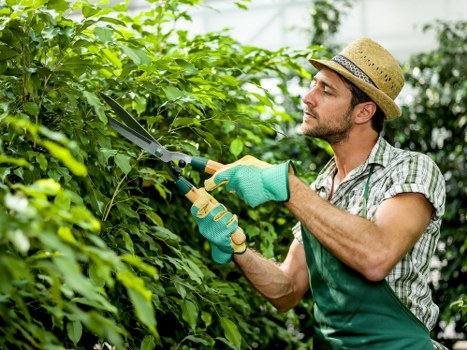
Healthy soil is the foundation of a thriving garden. Regularly testing your soil helps in understanding its pH level, nutrient content, and composition.
Based on the test results, you can amend your soil with the necessary nutrients. Organic fertilizers, such as compost and manure, enrich the soil and promote sustainable growth.
Implementing crop rotation and adding cover crops can improve soil structure and fertility, reducing the need for chemical fertilizers.
Composting
Composting is an excellent way to recycle garden waste and kitchen scraps, transforming them into nutrient-rich fertilizer for your plants.
Start a compost bin in your garden and regularly add organic materials like vegetable peels, grass clippings, and fallen leaves. Ensure proper aeration and moisture levels to speed up the decomposition process.
Use the finished compost to enrich your garden beds, enhancing soil health and plant growth.
Plant Selection and Care
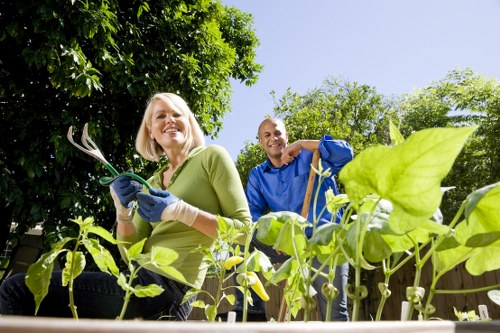
Choosing the right plants for your garden is crucial, especially considering Aldgate's climate and soil conditions.
Select native plants that are well-adapted to the local environment. They require less maintenance, are more resistant to pests, and contribute to local biodiversity.
Consider the sunlight requirements, water needs, and growth habits of each plant to ensure they thrive in your garden setting.
Perennial vs. Annual Plants
Perennial plants return year after year, providing long-term beauty and stability to your garden. They require less frequent planting and can be a more sustainable choice.
Annual plants, on the other hand, complete their life cycle in one season. They offer vibrant colors and variety but need to be replanted each year.
Incorporating a mix of perennials and annuals can create a dynamic and resilient garden.
Vegetable Gardening
For those interested in growing their own vegetables, proper planning and maintenance are essential.
- Choose varieties that are suitable for Aldgate's climate.
- Ensure adequate spacing to prevent overcrowding.
- Regularly monitor for pests and diseases.
- Provide consistent watering and fertilization.
Pest and Disease Management
Keeping your garden free from pests and diseases is vital for maintaining plant health.
Implementing integrated pest management (IPM) strategies can help in controlling pests naturally. This includes encouraging beneficial insects, using barriers, and applying organic treatments when necessary.
Regularly inspect your plants for signs of infestation or disease. Early detection allows for prompt action, minimizing damage and preventing the spread.
Organic Pest Control
Opt for organic pest control methods to maintain an eco-friendly garden. Examples include neem oil, insecticidal soaps, and introducing predatory insects like ladybugs.
Avoid using chemical pesticides that can harm beneficial organisms and disrupt the balance of your garden ecosystem.
Disease Prevention
Preventing plant diseases involves maintaining good garden hygiene. Remove dead or diseased plant material, and ensure proper spacing for airflow.
Rotate crops annually to prevent soil-borne diseases from building up. Use disease-resistant plant varieties to further reduce the risk.
Garden Tools and Equipment

Having the right tools is essential for efficient garden maintenance.
Invest in high-quality tools like pruners, spades, rakes, and watering equipment. Properly maintain your tools by cleaning and storing them correctly to extend their lifespan.
Consider eco-friendly equipment options, such as manual tools or battery-powered devices, to minimize your garden's environmental impact.
Tool Maintenance
Regularly sharpen your tools to ensure clean cuts and prevent plant damage. Clean tools after each use to prevent rust and deterioration.
Store tools in a dry, organized space to keep them in good condition and easily accessible for your gardening tasks.
Innovative Gardening Solutions
Explore innovative gardening solutions like rainwater harvesting systems, vertical gardens, and smart irrigation systems to enhance your garden's efficiency and sustainability.
These technologies can help in conserving water, maximizing space, and reducing maintenance efforts.
Landscaping and Design

Thoughtful landscaping and design can elevate the beauty and functionality of your garden.
Create focal points with feature plants, sculptures, or water elements. Design pathways and seating areas to encourage relaxation and enjoyment of your garden.
Use color schemes and plant combinations that complement each other, creating a harmonious and visually appealing space.
Sustainable Landscaping
Adopt sustainable landscaping practices to create an eco-friendly garden. Use native plants, reduce lawn areas, and incorporate sustainable materials in your design.
Implementing rain gardens and green roofs can contribute to environmental conservation while enhancing your garden's aesthetics.
Garden Lighting
Proper lighting enhances the beauty and safety of your garden during evening hours.
- Use solar-powered lights for an energy-efficient option.
- Highlight key features with spotlights.
- Create ambiance with string lights or lanterns.
Strategic lighting can extend your garden enjoyment into the night and add a magical touch to your outdoor space.
Climate Considerations in Aldgate
Aldgate's climate plays a significant role in determining the best practices for garden maintenance.
The region experiences a temperate climate with distinct seasons, requiring gardeners to adapt their maintenance routines accordingly.
Understanding local weather patterns, such as rainfall, temperature fluctuations, and humidity levels, helps in making informed decisions about plant care and garden management.
Dealing with Rainfall
Regular rainfall can be beneficial for your garden, but excessive moisture may lead to waterlogging and root diseases.
Ensure proper drainage in your garden beds to prevent water accumulation. Use raised beds or incorporate gravel pathways to improve water flow.
Managing Temperature Extremes
Temperature extremes, especially heatwaves, can stress plants and affect their growth.
- Provide shade for sensitive plants during peak heat hours.
- Use mulches to regulate soil temperature.
- Select heat-tolerant plant varieties.
Implementing these measures helps in maintaining plant health despite temperature challenges.
Professional Garden Maintenance Services

While DIY garden maintenance is rewarding, enlisting professional services can save time and ensure expert care.
Professional gardeners bring specialized knowledge and experience, handling tasks like complex pruning, pest control, and landscape design with precision.
Hiring a garden maintenance service in Aldgate ensures your garden receives consistent and high-quality care, tailored to your specific needs.
Benefits of Hiring Professionals
Outsourcing garden maintenance offers several advantages:
- Expertise in plant selection and care.
- Time-saving for busy homeowners.
- Access to professional tools and equipment.
- Customized maintenance plans.
These benefits contribute to a healthy, beautiful garden without the stress of managing it alone.
Choosing the Right Service
Select a reputable garden maintenance service that understands the unique needs of Aldgate gardens.
Look for companies with positive reviews, comprehensive service offerings, and a commitment to sustainable practices.
Consult with service providers to discuss your garden goals and ensure they can meet your expectations.
DIY Garden Maintenance Tips
For those who prefer a hands-on approach, here are some DIY tips to keep your Aldgate garden in top shape:
- Plan Your Garden: Design your garden layout considering plant types, sunlight exposure, and space requirements.
- Regular Watering: Ensure consistent watering schedules, adjusting based on weather conditions.
- Mulching: Apply mulch to conserve moisture, control weeds, and improve soil quality.
- Pruning: Regularly trim plants to encourage healthy growth and remove dead or diseased parts.
- Fertilizing: Use appropriate fertilizers to provide essential nutrients to your plants.
Implementing these practices enhances your garden's health and beauty while fostering a rewarding gardening experience.
Creative Gardening Ideas
Incorporate creativity into your garden maintenance to make it uniquely yours:
- Vertical Gardens: Utilize vertical space with trellises and wall-mounted planters.
- Water Features: Add fountains or ponds to create a tranquil atmosphere.
- Garden Art: Incorporate sculptures, mosaics, or handmade ornaments.
- Herb Gardens: Grow culinary herbs for easy access and fresh ingredients.
These creative elements add personality and charm to your garden, making maintenance enjoyable and fulfilling.
Eco-Friendly Garden Practices

Adopting eco-friendly practices in your garden contributes to environmental sustainability and enhances the health of your plants.
Implementing techniques like rainwater harvesting, composting, and using organic fertilizers reduces your garden's ecological footprint.
Encouraging biodiversity by planting native species and creating habitats for beneficial insects supports a balanced ecosystem.
Water Conservation
Conserving water is essential, especially during dry spells. Use efficient watering methods and select drought-resistant plants to minimize water usage.
- Install rain barrels to collect and reuse rainwater.
- Use drip irrigation systems for targeted watering.
- Mulch garden beds to retain moisture.
These measures help in maintaining a lush garden while being mindful of water resources.
Organic Gardening
Organic gardening avoids synthetic chemicals, promoting a healthier environment and reducing pollution.
Use natural pest deterrents, organic fertilizers, and compost to nourish your plants. This approach enhances soil fertility and fosters robust plant growth.
Wildlife-Friendly Gardens
Create a haven for local wildlife by planting diverse species and providing shelter:
- Include flowering plants to attract pollinators like bees and butterflies.
- Add birdhouses and bat boxes to encourage beneficial species.
- Maintain a small pond to support amphibians and insects.
A wildlife-friendly garden enriches the ecosystem and adds dynamic life to your outdoor space.
Final Thoughts on Garden Maintenance in Aldgate
Effective garden maintenance in Aldgate involves a combination of regular care, knowledge of local conditions, and sustainable practices.
By understanding the essential tasks, seasonal requirements, and innovative solutions, you can cultivate a garden that is both beautiful and resilient.
Whether you choose to maintain your garden yourself or seek professional assistance, the key is consistency and a passion for creating a thriving outdoor sanctuary.
Take Action Today
Ready to transform your garden into a stunning retreat? Contact us today to learn more about our expert garden maintenance services in Aldgate. Let us help you achieve the garden of your dreams!
